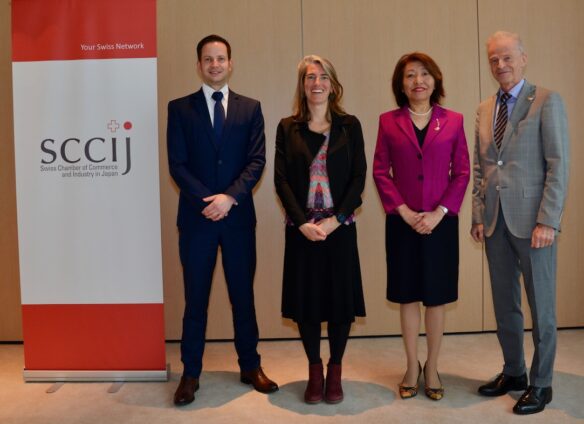Tokyo (SCCIJ) – Switzerland and Japan are the long-term winners of globalization. From 1990 to 2016, thanks to their open economies and due to growing global trade, Switzerland’s economic output has increased by 1,900 Euro and Japan’s by 1,502 Euro per person per year. This is the result of a research study by the consulting firm Prognosis on behalf of the German Bertelsmann Foundation. Germany ranked sixth as globalization winner with an annual per capita gain of 1,151 Euro. The report compares 42 industrial and emerging economies and measures the consequences of their international networking for people’s prosperity.
Degrees of interconnectedness
The retreat into the national sphere is in vogue – especially in the industrialized countries: The election results between Washington and Berlin reflect citizens’ concerns about the negative consequences of globalization. However, the Globalization Report 2018 of the Bertelsmann Foundation shows that the winners of globalization are often at home where the criticism of globalization is loudest: in the industrialized countries (download the full report from here).

Globalization creates wealth
This is the key finding of the Globalization Report 2018 which calculates the degree of international interconnectedness and the resulting increases in real gross domestic product (GDP) per capita for 42 industrialized and emerging countries. But since the industrialized countries have had a higher economic performance per capita for a long time, the absolute globalization gains are also significantly higher and difficult for the emerging countries to catch up.
As a result, one of the biggest construction sites of globalization would be the unequal distribution of globalization gains between industrialized and emerging countries, but also within states, the Bertelsmann Foundation said. Countermeasures would include market openings in emerging countries as well as the reduction of subsidies in industrialized countries.
Winner Switzerland
There have been only a few changes in the ranking of GDP gains due to globalization as compared to the 2016 report. The order of the three countries with the highest gains is now “Switzerland – Japan – Finland.” Compared to the calculations in 2016, Switzerland and Japan have switched places. One reason for this change is the fact that Switzerland was able to increase its international integration in the two added years (2015 and 2016), while Japan’s degree of globalization declined.
In India, the last ranked with respect to globalization-related welfare gains, this figure rose by an average of only 20 euros per year. China (80 euros per year) also recorded below-average gains. The main reason for these low growth rates in the emerging countries is the low starting level of GDP per capita at the starting point of the measurement. Emerging countries such as China and India only were at the very beginning of a dramatic growth curve in 1990 and thus performed worse overall in terms of absolute gains than industrialized countries, which were already more globally interconnected at that time.
About the Globalization Index
The starting point for calculating globalization-related welfare gains is an index that is closely aligned with the KOF Index of Globalization drawn up by the Swiss Federal Institute of Technology (ETH) in Zurich (the latest edition can be viewed here). The index measures the degree of global interconnectedness using indicators on the economic, political and social aspects of globalization.
The second step involves using regression analyses to calculate what impact an increase in globalization has on the growth of real per capita GDP. If the globalization index score rises by one point, this will lead to an increase of around 0.3 percentage points in the growth rate for real per capita GDP.
The final step was to compare the actual change in real GDP per capita between 1990 and 2016 with a hypothetical trend. For this trend, it is assumed that between 1990 and 2016 there was no intensification in the international interconnectedness of all the countries studied. This means that the globalization-induced growth gains that resulted from the actual increase in globalization are eliminated.
Text: SCCIJ with material of Bertelsmann Foundation; Photo: Pixabay CC0





























